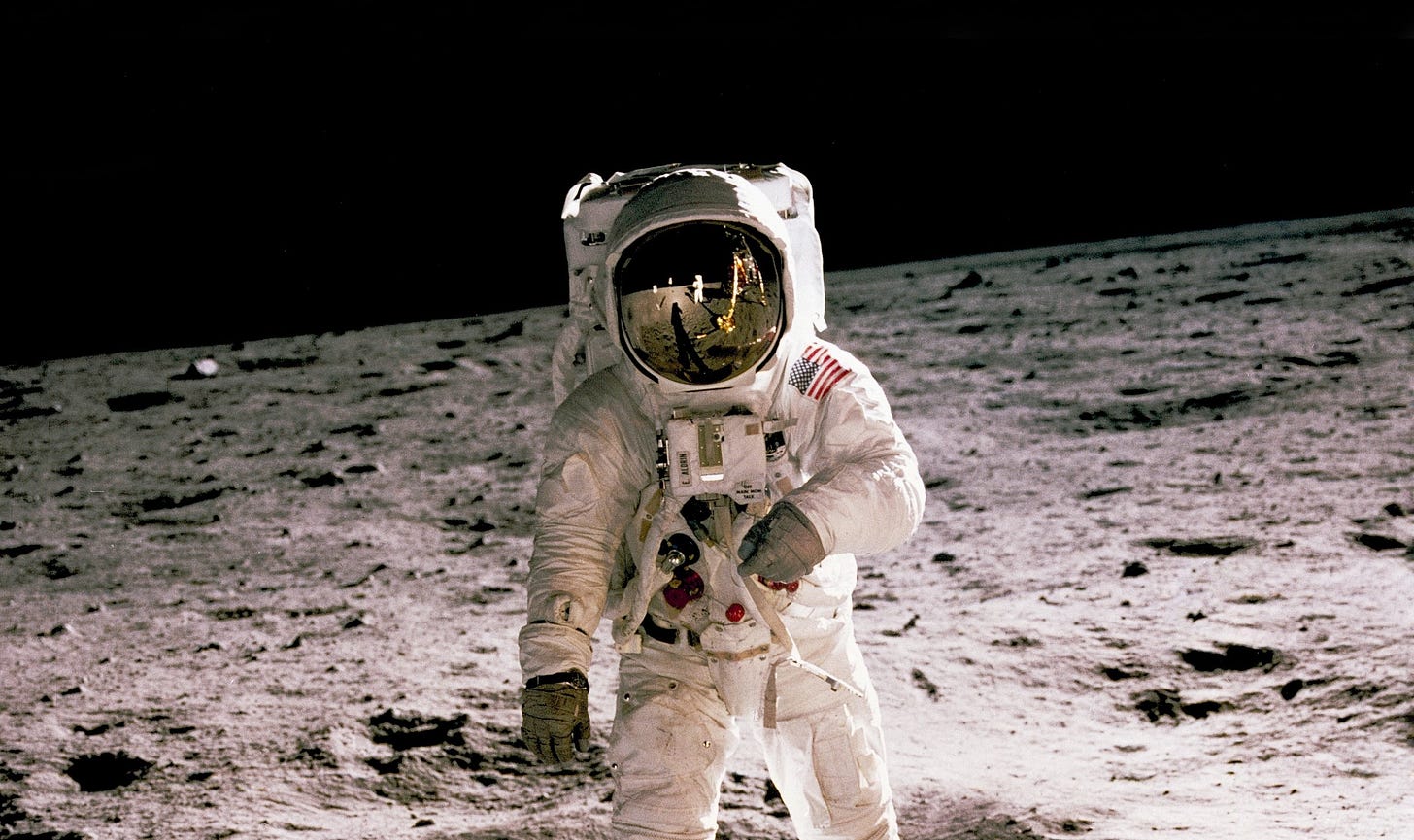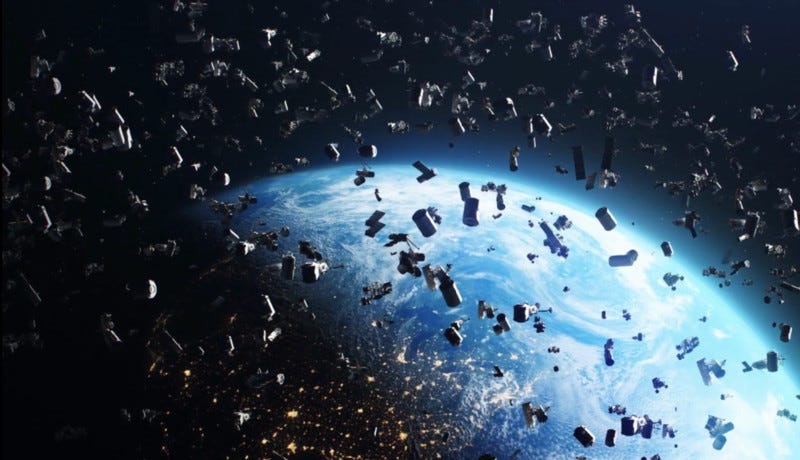Intergalactic & Cosmic Business - Part I
The recent Q&A raised more questions than answers. This is the first of 3 articles A Recount. The Metaphysical; and Impact on Earth will follow shortly.
Entering we felt the busy hum of the room and were enthusiastically welcomed by the promoter. With a substantial attendance we noted the only three spare seats were front and centre so with themed beverages and snacks in hand we self-consciously but excitedly took our seats.
Touted as an extraordinary evening part of National Science Week, it promised to ‘ignite your imagination and expand your understanding of the universe’ and offer an ‘inside scoop on the Australian Space Industry’.
An enthusiastic round of introductions prefaced an extraordinary discussion.
Now I enjoy astronomy but my colleague and I agreed we don’t understand many of the details the way my science trained partner does. We placed him between the two of us to have equal access to an interpreter. I look to the room -we are clearly surrounded by some serious science buffs. Based on our non-science background we decline to join an online quiz to test our astronomical knowledge. Pointless, right? Read on.
Moon-cations and Mining
The first two speakers enthusiastically raised the notion of vacation style space travel, moon mining to sustain further exploration, and burgeoning astronaut base comprising of people of colour and women. We were excitedly assured that the best way to capture the potential of space travel, cosmic holidays and economic growth was by harnessing the brightest minds. Moreover, those who were the best of the best in every area - medical, hospitality and so on- would also be required to assist with moon-vacations etc. 26,000 new jobs.
A quick interruption for a competition question. Favourite cosmic themed music? Hmm. I could have played this game.
Underlying this is the need to mine the moon in a ‘small area’ of 5x5kms to harvest underground water and on-site production to create oxygen to sustain human life and hydrogen fuel, supporting further space exploration.
A Modern Space Race for the Moon’s Resources
Urgency was repeated many times, stating how vital it is that America (and Australia as its partner) be focused on the prize. China, Russia and India also want to capture the Moon’s resources and the economic gain was estimated to be in the trillions of dollars.
A quiz interruption, one of several serious cosmic questions interspersed throughout the discussion. I marvel at the knowledge in the room and online.
Back to our next panel presenters. Two legal experts involved in developing international legislation as to who could lay claim to the moon, and specifically, our celestial body’s resources. Fascinatingly, they had spent time with traditional Aboriginal communities learning about their beliefs and the ancient connection between Mother Earth and the cosmos, including the moon. This seemed to have made quite an impression on the speakers with one mentioning that their work did not necessarily reflect their personal opinion. Further discussion followed about the intricacies of gaining broad consensus from all countries involved and the need to ‘get in quickly’ as a dominant player in the space game.
Mining the Moon? I hadn’t considered such a thing. And for the purpose of trillions of dollars to be made.
Post Q & A Research
A quick search on the legalities of Outer Space participation brings up the United Nations Treaty on Principles Governing the Activities of States in the Exploration and Use of Outer Space, including the Moon and Other Celestial Bodies. The treaty states, among other things, that:
outer space shall be free for exploration and use by all States
…not subject to national appropriation by claim of sovereignty, by means of use or occupation
States shall be liable for damage caused by their space objects
States shall avoid harmful contamination of space and celestial bodies.
A check of Wiki regarding the relevance of a treaty created in 1966 redirects readers to the 2015 U.S. Commercial Space Launch Competitiveness Act of 2015 which was created as a result of petitioning by private US companies to legalise space mining. It is claimed that similar national legislation is being adopted by Russia, India, China and others to legalise the appropriation of extraterrestrial resources. This raises the question whether the intent of the first treaty is being disregarded or in fact, did not foresee the use of celestial resources for commercial use and exploitation.
Hubris
An intrepid gentleman questioned - what did the panel think non-humans would think about this appropriation of the moon? A snigger ripples through the room in response and the question is lightly brushed off. I feel uncertain about what to contribute so say nothing. I am wondering about humanity’s infinitely large ego and suspect I am seeing it at play.
Humanity’s Mess
Finally, a question from the audience about the nature of exploration. What was their concern about the issue of space junk? A necessary inconvenience. They stated that every piece of debris 10 cm or larger posed a risk and offered a phenomenal number of items I can no longer recall, making up the current amount of debris. Junk is pushed into outlying orbit known as the junk graveyard and charted by NASA to minimise risk of collision. Well that’s a relief… A mention of newer technologies to draw debris back to earth made it clear that actioned responsibility for human trash in our cosmos is a recent consideration.
Food for thought:
According to Imarsat, a Global Satellite Company, “Based on statistical models produced by ESA's space debris office, it is estimated that there are 36,500 objects larger than 10cm, 1 million objects between 1-10cm, and an extraordinary 130 million objects between 1mm to 1cm.”
Another question for the competitors in the room and online - paraphrased.
Do you believe the opportunities/progress discussed to be positive, negative, or unsure?
It wasn’t the results that captured my attention which looked approximately like this - 54% positive, 22% negative, and 24% unsure based on 9 responders.
It was the statement that followed:
This ‘data’ would be used to inform future direction.
Let’s collect some broader data - what are your thoughts?
What does this ‘new’ direction mean?
Economic gain - trillion dollar venture - economic advantages - laws - ownership - moon mining - a modern space race - brightest minds needed - STEM - technology - moon-cations
In 2022, Bloomberg reported US President Joe Biden saying, “There’s going to be a new world order out there, and we’ve got to lead it,” and interestingly a little further research shows that US plans have been laid as early as 2015 for mining the moon’s resources. On 22 August 2023, Russia’s lander crashed into the moon, in a race to lay its claim in the ‘lunar gold rush’ only days ahead of India’s also failed attempt. This race has certainly become public.
Finally, I conclude, what we are seeing this evening is the hype being reflected from NASA's Artemis Program by governmental bodies, small and large private firms, academia, and other international space agencies.

And what did they from us?
That’s still unclear. There was a lot of promotion for various aspects and much back slapping in the conversations afterwards about student programs for steering our brightest minds in the STEM direction.
I couldn’t help but wonder:
What about the brightest hearts?
And is this the best use of our brightest minds for the good of all humanity?
I’d love your thoughts as Emma and I prepare a podcast and metaphysical examination of the event in the next post so please join the poll and leave your comments.
All are one and so I am reminding myself repeatedly that there is to be no vilification of our fellow humans (and non-humans for that matter). Why were we being shown this aspect of humanity tonight? There is much, much more to be discussed but I will end this here for now.
Blessings
Michelle x
Michelle Cowles
Spiritual Leader/Teacher/Learner
Copyright Michelle Cowles 2023
Disclaimer: The information on this page is general, lifestyle information and should not be used to diagnose or treat a health problem or disease.
Resources:
Space explained: How much space junk is there? (inmarsat.com)
Space Briefing Book: Space Law. International Space Law (Space Foundation.org)
Outer Space Treaty, (Wikipedia.org)
China, US Are Racing to Make Billions From Mining the Moon's Minerals (Bloomberg.com)
Moon mining gains momentum as private companies plan for a lunar economy (Space.com)








We live on a blue planet that circles around a ball of fire,
next to a moon that moves the sea and you don't believe in mirades?
Imagine the moon being destroyed and the catastrophic affect
My pressing issue is coming down to how as humans we seem to leave such an impact on our environment and we consider that it’s our collective right to encroach on other environments.